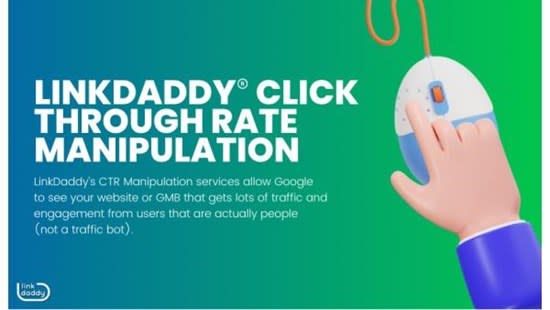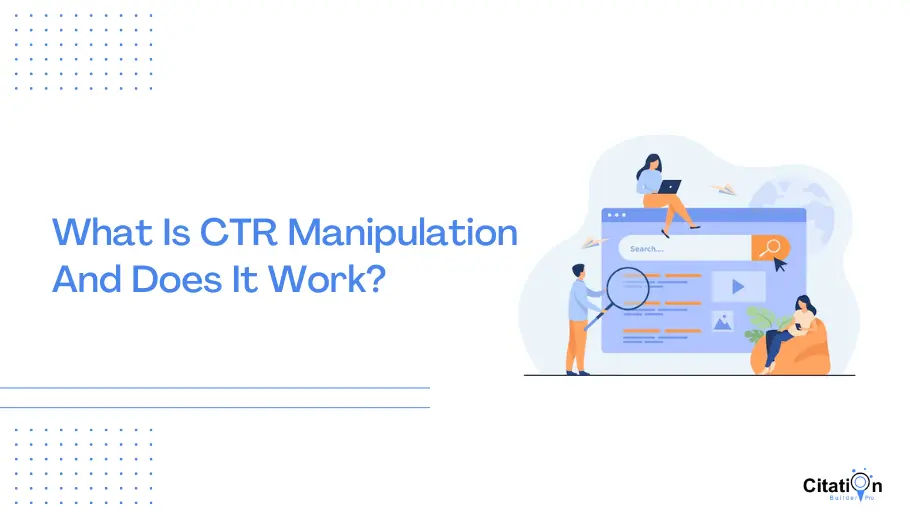GMB CTR Manipulation: Boost Your Google My Service Rankings
GMB CTR Manipulation: Boost Your Google My Service Rankings
Blog Article
Checking Out the Relationship Between CTR Control Services and User Behavior
In the world of digital advertising and marketing, the influence of click-through price (CTR) manipulation solutions on individual habits remains a complicated and appealing subject. As online systems significantly rely upon CTR metrics to measure the success of material, items, and services, recognizing just how these controlled rates influence individual involvement and decision-making processes is paramount. The interplay between CTR adjustment and customer habits raises questions about authenticity, trustworthiness, and the ethical ramifications of such techniques. By studying the complex partnership between CTR control services and user behavior, fascinating insights arise that might reshape our understanding of electronic advertising strategies and their effects on customers.
Effect of CTR Manipulation on Behavior
Evaluating the impact of Click-Through Price (CTR) manipulation on user habits discloses essential insights into the characteristics of online interaction. CTR control involves artificially blowing up the number of click a specific link or advertisement to trick users and internet search engine. This practice can result in an altered assumption of a page's popularity or significance, eventually impacting individual actions.

Furthermore, CTR adjustment can skew the information made use of by formulas to customize customer experiences. This can cause users being served content that does not straighten with their choices or rate of interests, eventually bring about a decrease in customer fulfillment and involvement. Comprehending the effect of CTR control on individual behavior is vital for maintaining transparency and trust fund in online interactions.
Individual Interaction With Controlled CTR
Individual interaction with adjusted CTR data often causes manipulated assumptions of on the internet material appeal and relevance. When individuals communicate with web content based on synthetically filled with air Click-Through Rates (CTR), they may believe that specific info, products, or services are extra preferred or credible than they actually are. This can cause customers choosing based upon deceptive information, resulting in potentially negative outcomes.
Involvement metrics like sort, shares, remarks, and time invested on a web page are commonly affected by CTR adjustment. Users may be a lot more inclined to engage with web content that shows up to have higher involvement prices, additionally perpetuating the cycle of skewed perceptions. As an outcome, web content developers and marketers might prioritize creating web content that produces high CTR instead than focusing on developing genuinely important and pertinent material.

Emotional Results of CTR Manipulation

Additionally, the psychological effects of CTR manipulation can likewise materialize in transformed decision-making processes. Customers may be a lot more likely to click material solely based on its viewed Extra resources appeal, as opposed to its actual worth or significance to their demands. This behavior change can cause a superficial interaction with online content, where users may neglect top notch yet much less preferred offerings for get redirected here those with synthetically improved CTRs.
Essentially, the emotional implications of CTR manipulation highlight the relevance of maintaining openness and credibility in on-line communications to cultivate genuine user involvement and trust fund.
Moral Factors To Consider in CTR Adjustment
CTR manipulation elevates worries about tricking individuals, distorting information analytics, and endangering the credibility of on the internet content. By unnaturally inflating CTR, customers might be misinformed into clicking on links or advertisements they would certainly not have actually chosen or else, leading to an insincere online experience.
An additional honest facet to consider is the justness of controling CTR to acquire an unreasonable benefit over competitors. Taking part in such techniques not just breaks concepts of fair play however also weakens the trust fund that customers put in on-line systems. It is necessary for companies and digital marketers to promote ethical criteria in their methods to make sure openness, reputation, and long-term sustainability in the on the internet atmosphere.
Ramifications for Digital Advertising And Marketing
CTR adjustment can lead to skewed information analytics, misinforming marketers into thinking that their campaigns are executing far better than they in fact are. When customers understand that CTRs have been adjusted, it can erode count on in the brand, leading to long-lasting unfavorable effects for consumer commitment and brand online reputation.
Furthermore, the use of CTR manipulation services can develop an unfair competitive landscape, where business that take part in such practices obtain an artificial benefit over those that follow ethical marketing criteria. This can suppress innovation and creativity in digital marketing, as success becomes even more regarding control tactics than delivering real value to customers. Ultimately, the effects of CTR manipulation for digital advertising and marketing prolong beyond short-term gains, influencing the overall sustainability and reputation of advertising and marketing efforts in the digital world.
Verdict
To conclude, the partnership in between CTR control solutions and user habits is intricate and diverse. The effect of CTR control on behavior, individual interaction with manipulated CTR, emotional impacts, ethical considerations, and implications for digital marketing all contribute in forming this relationship. Understanding these characteristics is critical for marketers and scientists alike in order to browse the ethical effects and make best use of the performance of their electronic marketing techniques.
Report this page